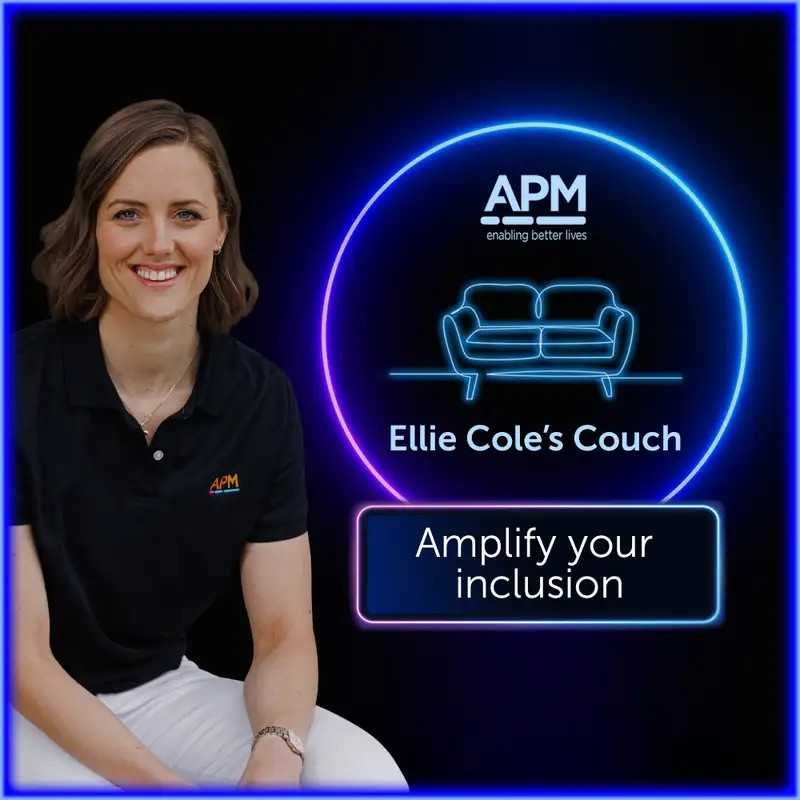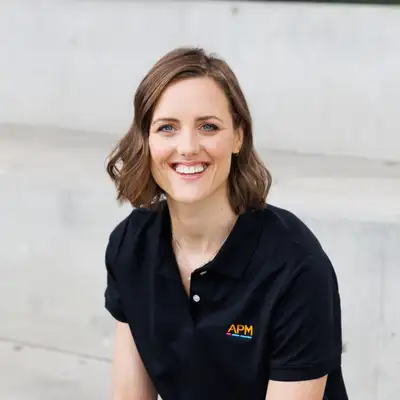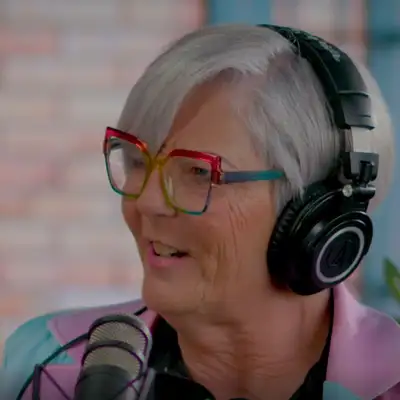Disability acceptance and understanding with Fran
Fran Oldham: Hi, Ellie. My name's Fran.
Fran Oldham.
I'm an employment consultant
for Disability Employment Services.
Ellie Cole: We're going to start talking a little bit
about the community
and where you grew up.
So, I can see your face lighting up
about where you grew up.
You didn't actually grow up in WA.
You grew up on the east coast of
Australia - you’re an ‘east coastie’.
Fran: Yes.
Ellie: Tell us about where you grew up.
Fran: I grew up in a tiny little town called Tarlee.
It's near Kapunda for anybody
that wants to look it up.
It had a population of 100 people
back in the day,
and to date, I think it's only got
about 300 people.
Ellie: So it's still very small.
Fran: So it's still very, very tiny.
Ellie: What was the town like? Having a
population of 100 people,
I'm assuming there was maybe
a supermarket?
Fran: No.
Ellie: A petrol station?
Fran: No.
Ellie: A school?
Fran: One school.
Ellie: Okay, so it was a very
small community there.
Tell us about what it was like there.
Fran: The Post Office was Post Office
come bakery, come supermarket,
I suppose you could say. It was a
milk bar back then.
It was all in one.
Not even the size of this room.
Ellie: If I was going to come and visit,
what would be the top
five things that I would be doing there?
If I was coming to visit you for the day?
Fran: Going to the school to play on the swing.
Playing with dirt.
Playing with sticks and stones.
Building houses out of sticks and stones.
Collecting flowers along the street
and building tiaras, making mud pies.
Yeah, we grew up with nature.
We slept out under the stars.
We, yeah, we did things different
to the way we do things today.
Ellie: Absolutely.
Fran: There wasn't the fear of the next door
neighbour, who they may be.
We all knew everybody.
And there was a bartering system,
where dad would be the one
that would kill the sheep and carve it up
and whatnot for our family,
but also for other families
that lived in Tarlee,
And it was a barter system,
so dad would give a leg of lamb
for a crate of oranges.
Yeah.
Ellie: That's amazing. It works very
similar at my parents’ sheep farm.
So, you know, we have sheep
that we use for meats,
and my parents do the same thing.
But they live in a country town
that has more than 100 people though.
You know, they swap their lamb
for fruits and veggies, and everyone
kind of just trades their own produce,
and it does create a really
nice community there.
What's really interesting, as well
is, hearing about how you grew up
despite having, you know, only
100 people live in the town.
I think if I think about my childhood,
it was actually very similar,
and I grew up in the suburbs.
So I was, you know, outdoors building like,
you know, little houses out of sticks.
It's amazing, you know,
being able to harness the imagination
of being a young child
no matter where you are,
if you live in a town of a 100 people
or in the suburbs.
Fran: Yeah!
As kids we had one tricycle,
and every year dad
would paint it a different colour
and it would go to the next child.
And once it got to me, I was the queen.
I decided who could ride on the back of it,
and you’d put the kittens in there,
you'd put the Bluetongue lizards in there,
you'd put the dog in there.
Ellie: You grew up with a lot of siblings,
didn't you?
Fran: Yeah, I was, as I say, I was second youngest.
Ellie: Second youngest of how many?
Fran: 14.
15 actually, but one no longer,
and I was second youngest.
And my younger brother, he was my baby.
There's only a year difference,
pretty much between the last four kids.
And then my brother that's
a year older than me,
a lot of people mistake
us for identical twins.
The shape of our face, the way
we communicate with each other.
But he was born profoundly deaf.
So we learned what it was like
to develop a language
that nobody else understood.
He was going away to school
and was only at home on holidays.
So when he'd come home from holidays,
he would teach us how to do sign language.
But to us that was the norm.
We didn't see him as any different.
And still to this day, I can
have a phone conversation
or a video conversation with Peter,
and I don't have to look at the screen
because I understand what he's saying.
Ellie: Just have an intuition, don't you?
Fran: Yeah, I do.
Ellie: You seem to have an intuition,
I think with your siblings,
but when one has a disability
or is profoundly deaf, I think
that manifests into something
that's so much more connected.
Fran: People would be able to walk beside us
or come towards us, and they'd be like,
“which one’s Peter? Which one's Fran?
Which one's the deaf one?”
So, Peter and I would actually do
what twins do,
I suppose you could say, and we would
pull the Mickey out of people.
They would be thinking that he was the hearing
one and I was the deaf one,
so they'd be talking to me
as if I was deaf and it’s like,
“you don't need to talk to me
any different.”
Ellie: I suppose that gave you a real
understanding though of what it was like for him.
If people confuse the two of you,
you know, growing up looking
the same, one was profoundly deaf
and one wasn't,
you still were able to experience
the treatment that he may have received,
particularly in a small community.
And what was that like for you?
Fran: It was amazing as a child.
But from the age of 11, we had to move
over to Victoria, to live with grandmother.
And that's where the disjointedness of the
happy childhood became apparent,
because people treated my brother differently.
People... the horrible names,
the horrendous names.
And that caused me to
become so defensive,
to protect my brother.
Because to me, he was no different than me.
He just lost - or wasn't born with - one of his senses.
So, I suppose I became his ambassador, to go out
there and go, “he's no different to me.”
And I wanted the world to see
that he was a beautiful person,
and to look beyond his disability
or his inability to hear, because that's
the only thing different to him and I.
Ellie: With your brother growing up
with a disability,
we mentioned that you became
a huge advocate for him,
you saw so much potential in him
that others may not necessarily
have seen at the time.
What are the skill sets about him
that really shine out to you
from when he was young, having to navigate
having a disability from birth?
Fran: His character. He's a prankster.
And a lot of people
don't know how to take him,
because he obviously does
have a different way of pronouncing words
because he wasn't fortunate
enough to be given
the options that we've got today
for people that are born deaf.
So he does speak differently
but other than that,
yeah, his special traits,
he is kind, he's caring.
He's magnificent with his hands.
Creating the most remarkable
pieces of furniture.
Ellie: You mentioned that you worked
in aged care, so,
you used to write on the whiteboard?
Fran: I used to write on the whiteboard
when I was teaching,
the word disability,
and I'd ask people,
what do they see in that word?
And pretty much everybody
had said the word ability.
And I took them back.
What does the word dis mean to you?
Take away.
You put take away and ability together,
you're taking away that person's ability
instead of identifying what that person's
goals and achievements
are and growing on that,
and assisting that person to progress
to become a better person.
To, yeah, shine.
Ellie: It's amazing, the words and the actions
that we have can be so empowering,
but in the same turn,
they can also be extremely disempowering.
And that seems to sit very
strongly with you.
Fran: It does, it does.
Ellie: Do you think that's because of your
upbringing with growing up
having a brother that
has an impairment?
Fran: An impairment, thank you.
100%. One hundred percent.
Because I saw the bullying, I was there
firsthand defending my brother.
Getting fat lips because I wouldn't
get out of the way.
Because people
were making fun of my brother,
because of him not being able to hear
what everybody else was saying about him.
Ellie: Are you able to speak about what
it's been like working at APM?
You've been there for six
and a half years.
How did you, I suppose,
step into the world of APM
and Disability Employment Services?
Fran: I had wanted to get into APM
or a company like APM
for quite some time.
My journey of working with people
with disabilities in aged care
was coming to an end.
I was tired after 19 years of doing it,
and I applied and a couple of days later
I got the call to say,
“would you come in for an interview?”
And the interview was exactly how
we are, right here, right now.
They got to know me.
They got to see the true Fran.
We sat, we talked about what I identified,
or what would I identify
as supporting a person with a disability?
And from memory, I spoke back
about my brother Peter.
And I was fortunate enough
a couple of days later
to be told that I gained the position.
And I struggled. I struggled with the system.
I just wasn't getting my head around it.
But APM, their kindness,
their caring nature, their compassion
for absolutely anybody that wants to
learn, is unbelievable.
And I stuck it out.
And I'm coming up to six and
a half years of being with APM.
I moved over to Disability Employment
Services just over two years ago.
Ellie: Now, you mentioned before
that APM have taken very good care
of you as well as an employee.
Fran: Amazing care.
Ellie: Are you able to elaborate
a little bit on that?
Fran: So, as much as I sit here and I giggle
and I’ve got a smile on my face,
I actually have a few disabilities myself.
Two of my main ones,
one is PTSD from a childhood trauma,
and the other is a spinal issue,
where I've had to have
major, major surgery done on my spine
to enable me to walk, to sit.
Ellie: Really?
Fran: Yeah, I have my own little bionic machine
inserted in my spine as we speak,
and I have remote control,
and I charge my back up every night.
I have my own private TENS machine.
Ellie: So do you experience lots of nerve pain?
Fran: I did, I did.
Ellie: I broke my hip a couple of years ago
and I damaged one of my nerves
and it was excruciating.
I couldn't imagine what it would be like
to live with - Fran: I lived with it.
Ellie: chronic nerve pain.
Fran: 24 hours a day,
365 days a year for over 10 years.
So, obviously it was before
I came on board with APM.
So I came on board with it.
They wrapped me up in cotton wool
is the best way to describe it.
They provided me with
sit-stand desk, modified chair,
which is known as an
“Executive Big Ass Chair,”
where the seating
has actually been cut out.
Ellie: Is that to alleviate the pressure
going through your coccyx bone?
Fran: (nods) The countless operations
that I had within a 12 month period,
APM has been instrumental
in supporting me.
I've not made it a secret,
my journey to get to where I am today.
And the support that I've received
from the EAP
to my manager,
to the state manager, to staff.
“Fran, have you made your
booking with EAP?”
“Fran, are you doing okay?”
If they see that I'm having a blue day,
not a problem.
They'll take me off the floor,
take me outside,
have a cup of coffee.
Ellie: Amazing.
Fran: Yeah.
Ellie: Fran, it's amazing to hear that you're so well
taken care of at APM, because I think
for anyone that comes into work
with a health condition,
with an impairment, there can often
be a lot of anxiety surrounding that.
Fran: I was scared.
Ellie: Exactly. You know, there's so much anxiety
and a lot of people hide
exactly who they are or what
their impairments are, or what
their health conditions are,
when coming into work,
because they are scared.
They're scared of not receiving
the right supports,
and for you to be able to experience
that yourself and then carry
that forward to your clients at APM
must be so empowering
for yourself, as well as the clients
that you deal with every day.
Fran: I'm honoured each and every day
where I've got my manager in the office,
or even just a phone call away
because she's at one of our other sites.
I'm honoured to tell the clients,
you know, I hand out both my card and her card
at the same time, and I'm like,
“you know, if you can't get a hold of me,
you get a hold of her,
because she will understand you.
Because she understands me.
She accepts me for who I am.
She's definitely going to accept
you for who you are.”
And it gives them great comfort
knowing that it's not just me
that that person can come to.
They've got my colleagues on
either side of me,
but they've also got my manager,
and that makes them super special.
Ellie: And definitely would alleviate
a lot of anxiety as well.
I don't think,
people are told enough that,
you know, they can come in exactly as they are.
Fran: Exactly.
Ellie: And they'll be supported
in that space as well.
Fran: Yeah. Because we don't see them
as being any different to us.
I go to the point of taking myself
away from my computer
and my fancy sit-stand desk and my lovely
“Big Ass Chair”, and I go and sit
on the same side as a the client,
and we do informal appointments.
Ellie: I think, from speaking to participants
myself, the biggest fear of walking
into Disability Employment Services for
the first time is the fear of the unknown.
They don't know what to expect,
they don't know what it's going to be like
and make a lot of assumptions.
But, you know, walking in and then meeting
someone like you, going through
Fran's seven steps of
self-discovery and leaving
feeling quite empowered
is certainly a theme
that has come through to me very strongly
when I speak to APM participants.
Yeah.
And, you know, being able to speak
to people that work for APM as well
and how empowering it is for
people who work for APM
as well as participants,
is really heartwarming for me to hear.
Fran: I go into the unknown each and every day.
Just because you think you know somebody,
it's not until that day comes
that you
discover something new about
that person.
And that's the fun of going to work.
Trying to find
what is so different about that person,
what makes that person tick.
It's not their disability
that makes them tick.
It's their life,
before they walk through our doors
that makes them tick.
We're only a small part of their journey
to make them
a better version of themselves.
From taking them, guiding them,
providing them that,
whether it be emotional support,
or financial assistance.
Putting them through courses.
We do it all.
We take them to Centrelink,
and we decipher the language barrier
between a person
standing behind a desk, to a person
sitting at a desk.
We decipher and we be that
person's spokesperson.
Ellie: Thank you so much Fran.
I really loved talking to you and
I know that this little series
is going to make a huge impact.
I think you'll be the most popular woman
on the West Coast after this.
Fran: I hope so.
I hope people will learn
something from it,
to treat everybody equally
because we are all equal.
Ellie: Thank you so much for your time.


